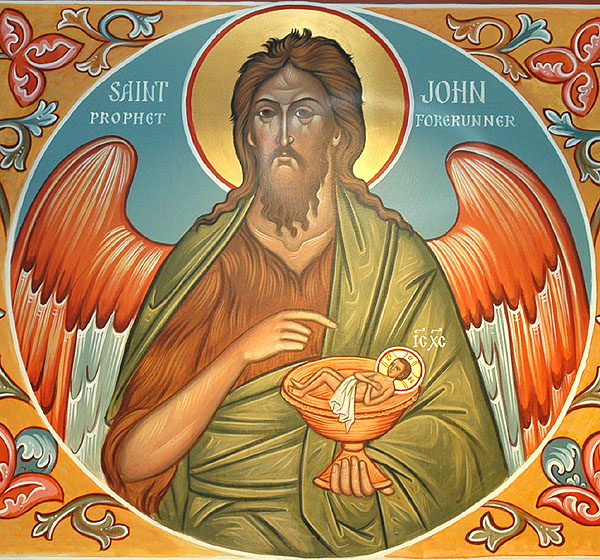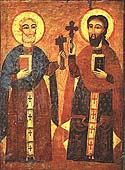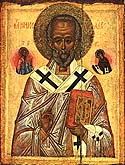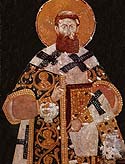Other Feasts
On each day of the year the Orthodox Church commemorates certain saints or sacred events in its history. In addition to the twelve major feast days mentioned above, the entire Orthodox Church celebrates a number of other days with special liturgical and spiritual solemnity.


First among the feasts universally celebrated by all the Orthodox are those of Saint John the Baptist (on left) of whom Christ has said that “among those born of women there has arisen none greater” (Mt 11.11; Lk 7.28).
The feasts of the apostles are also celebrated in all the churches, particularly the feast of Saints Peter and Paul (on right) which is preceded by a prescribed fasting period.

Certain other saints are especially venerated throughout the world as well, such as Saints Nicholas (on left) and George, the Prophet Elias and the Archangel Michael, together with the hierarchs, Saints Basil the Great, John Chrysostom, and Gregory the Theologian.

Each local church also has its own particularly holy days. In the Greek Church Saints Spiridon, Demetrios, Nektarios, and others are highly venerated, just as Saints Sergius, Seraphim, Tikhon, and Vladimir are in the Russian Church; Saint Sava (on right) in the Serbian Church; and Saint Herman in the American Church.
In addition to those special festal days of the particular national churches, there exists also the practice for certain cities, towns and monasteries to have liturgical celebrations of holy persons or events proper to their own particular interests and desires. Thus there exist certain saints, for example, which are celebrated with great solemnity in just a very few places in the Church, perhaps even in just one particular place where they have a special importance for the faithful.
It is necessary to note that in the Orthodox Church the liturgical feasts are not “institutions” which are legislated by some ecclesiastical authority apart from the interest and consent of the people. The feasts of the Church, and even the canonization of saints, always follows from the living devotion of the Christian people. If there were no popular interest and veneration of a certain holy person, there would be no official canonization and no liturgical festival established in his or her honor. Once a person is recognized as a saint, however, and it is agreed that God himself is presenting this person as a living witness to himself and his Kingdom, then the Church hierarchy will set the day of the feast and will compose the proper liturgical service and hymns to be used in the celebration. The frequency and fervor of the celebration will then depend solely upon the will of the people, and once established the feast could only disappear organically, in a way similar to its appearance. It would not, and indeed it really could not be “disestablished” by the decree of any church authority.
